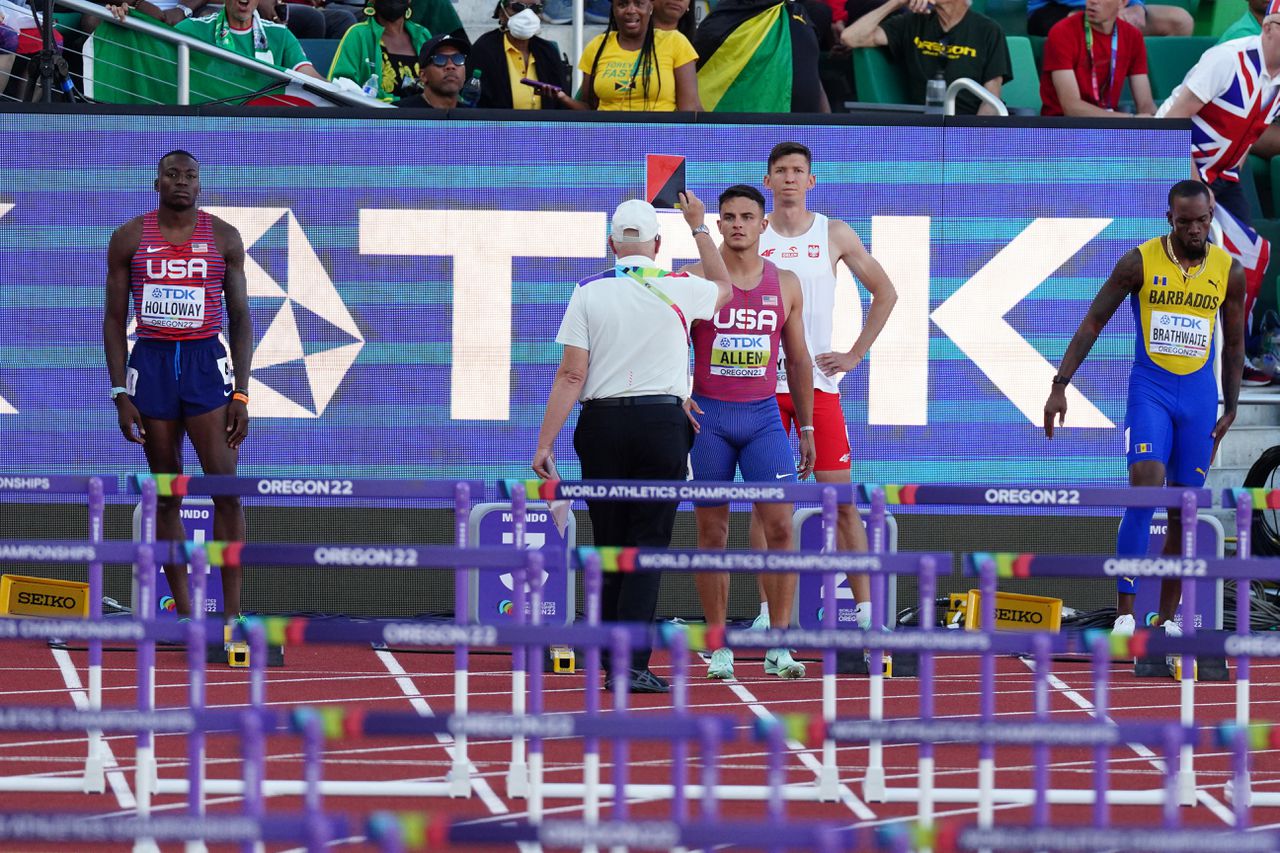Devon Allen knew what stood in his path on Sunday night.
Ten hurdles, each as tall as a standard doorknob, carefully arranged nine meters apart in Lane 3. There is never any variation in the 110-meter race in which only two men have ever been faster than Allen. No matter where the race is run, when or against whom, those hurdles are constant.
Just as reliable, however, is the obstacle with which Allen collided: a sport that keeps finding ways to keep its best athletes from competing.
If there is one thing international track and field can be trusted to get right, and there might only be one, it is to rigidly enforce its most archaic and arbitrary rules.
So, with six nights remaining in the sport’s global showcase at Eugene’s reimagined Hayward Field, the only question is whether any remaining moment can overshadow the calamitous disqualification of Allen due to a false start Sunday night.
Honestly, it might not matter how many world records fall between now and next Sunday night. Or how many more Americans claim gold.
These World Athletics Championships, being staged for the first time on American soil, have already had their signature moment.
For a sport that is thirsting for greater domestic support in advance of the 2028 Olympics in Los Angeles, Sunday’s ruling perfectly demonstrated why track and field can seem so inaccessible to casual viewers.
Allen, a former two-sport star for the Oregon Ducks who will report to Philadelphia Eagles training camp later this month, is just the kind of athlete who might draw in a new kind of viewer. But anyone who tuned into NBC on Sunday saw Allen explode out of the blocks, only for the race to be stopped and for Allen to be sent off the track.
It was a false start. At least that’s a term that football fans are familiar with. But in this case, he didn’t go before the snap — er, starting pistol. He went too soon after it.
Just imagine what kind of reaction Philadelphia fans would have had to that explanation.
“I’ll make sure I just kind of react not as fast next time,” a bewildered Allen told reporters after his premature exit.
Track officials long ago decided that a typical reaction time was a tenth of a second, an arbitrary figure with which sports scientists have quibbled. Anything faster would be deemed a false start and a disqualification.
Allen jumped at 0.099 seconds. One-thousandth of a second too fast.
By rule, Allen needed to be disqualified. No one on the ground could dispute that or reverse the decision.
But it is an asinine rule, and it’s hard to imagine that any fan who tuned in on Sunday night came to a different conclusion.
An imperceptible difference, faster than a heart breaks.
And this is the same sport that kept dynamic sprinter Sha’Carri Richardson out of the Olympics last year, even though she already had qualified, because of a positive marijuana test.
Track and field is the only sport that seems so intent on finding loopholes to keep its stars sidelined, but it’s far from the only one with mind-boggling procedures.
I’ve long scratched my head over the logic behind spotting the ball in football. For the first three downs of a series, it is the referee’s judgment call. The accuracy of the spot is only as good as his or her last eyeglasses prescription.
Nobody is questioning whether it is precise down to one-thousandth of an inch.
But on fourth down — oh, fourth down! — the chains come out. The crowd quiets. The spot is theatrically determined with the exactitude of a surgeon cutting into the human brain.
Games are decided this way. Entire seasons.
Track officials figured out a way to remove the possibility of human error. The sensors tell officials when there is a false start. But the human error was giving the machines that much power over the outcome of what should be the simplest and purest sport.
Imagine putting sensors on the cleats of offensive linemen.
They would still be replaying first down somewhere.
There are certainly great moments still to come in Eugene. Allen’s disqualification, while ludicrous, has no bearing on the performances that await. Perhaps Sydney McLaughlin can break the world record in the women’s 400-meter hurdles — for a third time. Or the U.S. men can sweep the 200-meter sprint, just like they did the 100.
But would any of those penetrate the mainstream conscious of American sports like Sunday’s technicality?
We can only hope so.
The sport of track and field is sustained by the belief that human beings, through training, nutrition and resolve, will forever have the capacity to shave a tenth of a second off of a record time. To run ever-so-slightly faster than anyone ever has before. To jump higher or longer. To throw farther.
But not to react quicker?
Maybe someday track and field will get out of its own way.
It’s just too bad that couldn’t happen before it tripped up Allen.
— Bill Oram | [email protected] | Twitter: @billoram


